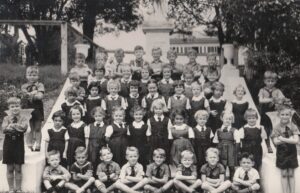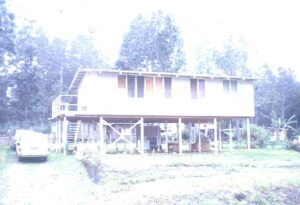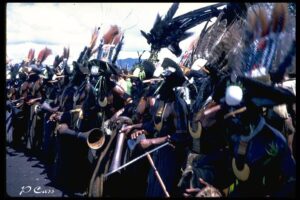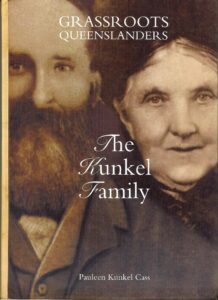Defining Experiences
We all have experiences that change our view of the world from migration to family moments. While acknowledging the impact of marrying and having children, and grandchildren, as lasting defining experiences, today I thought I’d look at external factors that significantly impacted my world view.

Pauleen’s school photo at St Joan of Arc school in Brisbane.
Post-War Migration
In primary school I attended a small near-inner city suburban Catholic school. Each class was small and we were all taught by nuns. In the early years of primary, our suburb had an influx of post WWII immigrants who were Catholic. There were people from Poland, Czechoslovakia, Ukraine, Malta and no doubt more. By the end of primary, there was a large Dutch immigration, so much so we had several Dutch priests who were multi-lingual.
I learned that these young people, my own age, were the intermediaries between their parents and grandparents and the Australian bureaucracy. Many of their parents worked in factories at Golden Circle Cannery or the local Mynor cordial factory. Invitations to play always involved bi-lingual negotiation with the older person for approval. An Italian friend at high school and university had similar responsibilities.
This introduction to different cultures gave me an opportunity to see the challenges faced by these migrants and to be tolerant of different language experiences. Having said that, I had little, if any, understanding of their experiences of war and unsettlement, and the decision to migrate.
My own “migration” to Papua New Guinea

Our house at North Goroka with a village at the back.
Ten days after we married, we were on our way to our new life in Alotau in the then-Territory of Papua and New Guinea. While Peter had done his best to educate me with books, I had only a superficial understanding of how my life would change. Leaving my family and friends, and my working-class suburban life, was a dramatic change to my experience of a small town in Milne Bay District. Peter was so familiar with it all after living there most of his life, it should have been easier for me, but then for him it was all normal. It took some adjustment but I came to love the country and the people with all their diversity. So much so that on my return to have child #1 in Brisbane, PNG was now home, not Brisbane.
Living in different towns, learning the new geography and the different tribal groups was quite an experience. There’s nothing that can really prepare you for being at a huge sing-sing with thousands of people in traditional dress (spears, arrows and all). We were privileged to work towards the country’s self-government in 1973 when we were in Goroka in the Highlands, and then in Port Moresby for all the Independence celebrations in 1975. We left a few years later to bring our kids back for an Australian education. Even though they were young when they left, they too have many memories and the experience has been formative for them as well.

Wahgi warriors at the Goroka Show.
If you’re keen to learn a little more about my PNG life you might like my A to Z posts from a few years ago: https://cassmobfamilyhistory.com/category/memes-and-themes-blogging/a-to-z-2019/
Travel
A side-effect of working in PNG was our opportunity to travel during our bi-annual leave (and later annual leave). While we came back to Australia regularly, we also had the opportunity to travel overseas – something I’d never imagined as a child that would be possible. Again, seeing different countries and their peoples, having to adapt to language and process differences, was another opportunity to see life from the other side.
Family History

Pauleen’s book ‘Grassroots Queenslanders The Kunkel Family’
Back in 1986, when I took up membership in the Genealogical Society of Queensland (GSQ) I had no idea how it would change my life – or do I mean take it over?
Over the decades it’s kept me sane when life’s ups and downs were challenging, gave me something else to focus on when work was difficult – and gave the children the chance to visit cemeteries with us, and collect certificates from BDM in the city. I’m not at all sure they’d see these as positive life experiences. Family history has also lent a focus to overseas and local travel, as we explore ancestral locations. We’ve had some great adventures along the way.
It’s amazing to think back over the changes in how we research, and the technology we use now. I’ve definitely enjoyed the journey, the learning and the wonderful friends I’ve made near and far.
What do you think have been defining experiences that led to your view of the world?

An interesting life.
Catherine I think we all have different experiences that form us.
I loved your article Pauleen. I was born in Rabaul. Almost universally once people spend some years in PNG it never leaves them entirely, no matter how far they roam.
My mum fostered some PNG children who attended New Farm State School in the 1980s. At one point mum said there were 54 nationalities represented at the school.
Without migration stories how could we fill in the blanks? I’ll follow up on your link to your earlier blog.
Christine Leonard
Thanks for commenting Christine. I agree with you that PNG carves a place in the hearts of those who’ve lived there. Are you a member of the FB page “I used to live in PNG”? It’s very interesting.
54 nationalities at New Farm school is amazing…more than I’d have expected.